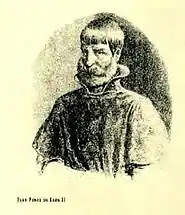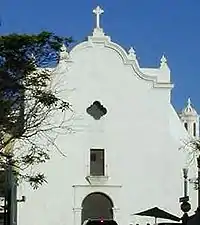Juan Ponce de León II
Juan Ponce de León II (1524 - 1591)[1] was the first acting governor of Puerto Rico to be born on the island.
Juan Ponce de León II | |
|---|---|
 | |
| Acting Governor of Puerto Rico | |
| In office 1579–1579 | |
| Preceded by | Francisco De Obando Y Mexia |
| Succeeded by | Jerónimo De Agüero Campuzano |
| Personal details | |
| Born | 1524 San Juan, Puerto Rico, Viceroyalty of New Spain |
| Died | 1591 (aged 66–67) San Juan, Captaincy General of Puerto Rico, Spanish Empire |
| Nationality | Puerto Rican (Spanish) |
| Spouse(s) | Doña Isabel de Loayza |
| Relations | Juan Ponce de León (grandfather) Juan Ponce de León y Loayza Luis (sons), Isabel and María (daughters) |
Early years
Ponce de León II (birth name: Juan Troche Ponce de León[note 1]), was born in San Juan, Puerto Rico, Viceroyalty of New Spain, to Juan García "Gracia" Troche and Juana Ponce de León. The Spanish conquistador Juan Ponce de León was Ponce de León II's maternal grandfather.
Settlement in Trinidad
Ponce de León II was sent by the Spanish Crown to establish a settlement on the island of Trinidad in 1569. He founded the "town of the Circumcision", probably around modern Laventille. In 1570, this settlement was abandoned, possibly because of the raids by the Caribs which resulted in the death of de Leon's son. According to some historians, Ponce de León II may have been an on-and-off governor of the island from 1571 to 1591.[2]
The first Puerto Rican acting governor of Puerto Rico
In 1579, the Spanish Crown named Jerónimo De Agüero Campuzano governor of Puerto Rico. He was to replace the then governor Francisco De Obando Y Mexia. During the time that it took Jerónimo De Agüero Campuzano to travel from Spain to Puerto Rico, Ponce de León II was appointed acting governor. He thus became the first native-born Puerto Rican to be appointed Spanish governor of Puerto Rico.[3]
Written work "Melgarejo's Memoirs"
In 1581, at the request of King Phillip II of Spain, Juan Lopez Melgarejo, who served as governor of Puerto Rico from 1581 to 1582, asked Juan Ponce de León II to write a general description of the West Indies with emphasis on the part corresponding to Puerto Rico. He did this with the collaboration of his fellow Puerto Rican Antonio de Santa Clara. Ponce de León II's written work Memorias de Melgarejo (Melgarejo's Memoirs) is one of Puerto Rico's most important historical documents. In 1581, Ponce de León II was able to establish the exact geographical coordinates of San Juan by observing an eclipse.[4][5]
Later years

Later in life, after he became a widower, Ponce de León II embraced and lived a religious life. He took it upon himself to transfer the body of his grandfather, Juan Ponce de León, to San José Church in San Juan from Cuba, where he had died and been buried in 1521 after being wounded in an attempt to colonize Florida. His grandfather's remains were moved once again in 1913, when they were transferred to the Cathedral of San Juan Bautista, which is also located in Old San Juan.
Juan Ponce de León II's remains are still interred at San José Church in San Juan. Puerto Rico has honored his memory by naming a high school in the town of Florida, Puerto Rico after him.
Ancestors
| Ancestors of Ponce de León II | ||||||||||||||||||||||||||||||||||||||||||||||||||||||||||||||||||||||||||||||||||||||||||||||||||||||||||||||||||||||||||||||
|---|---|---|---|---|---|---|---|---|---|---|---|---|---|---|---|---|---|---|---|---|---|---|---|---|---|---|---|---|---|---|---|---|---|---|---|---|---|---|---|---|---|---|---|---|---|---|---|---|---|---|---|---|---|---|---|---|---|---|---|---|---|---|---|---|---|---|---|---|---|---|---|---|---|---|---|---|---|---|---|---|---|---|---|---|---|---|---|---|---|---|---|---|---|---|---|---|---|---|---|---|---|---|---|---|---|---|---|---|---|---|---|---|---|---|---|---|---|---|---|---|---|---|---|---|---|---|
| ||||||||||||||||||||||||||||||||||||||||||||||||||||||||||||||||||||||||||||||||||||||||||||||||||||||||||||||||||||||||||||||
Notes
See also
- Juan Ponce de León
- List of Puerto Ricans
- List of Governors of Puerto Rico
References
- Juan Ponce de León. By Jane Sutcliffe. Minneapolis, MN: Lerner Publications Company. 2005. ISBN 0-8225-2944-0. Page 42.
- "Spanish Governors of Trinidad". Archived from the original on 2007-06-09. Retrieved 2006-06-21.
- Casa Blanca reveals centuries of San Juan history Archived 2009-06-14 at the Wayback Machine
- Historia de la investigación científica en Puerto Rico Archived 2011-09-30 at the Wayback Machine
- Op. Cit: Boletín Del Centro de Investigaciones Históricas. Oficina de Publicaciones, Facultad de Humanidades, Departamento de Historia, Universidad de Puerto Rico. 1985. pp. 107–108.
External links
| Preceded by Francisco de Obando y Mexia |
Governor of Puerto Rico 1579 |
Succeeded by Jerónimo de Agüero Campuzano |